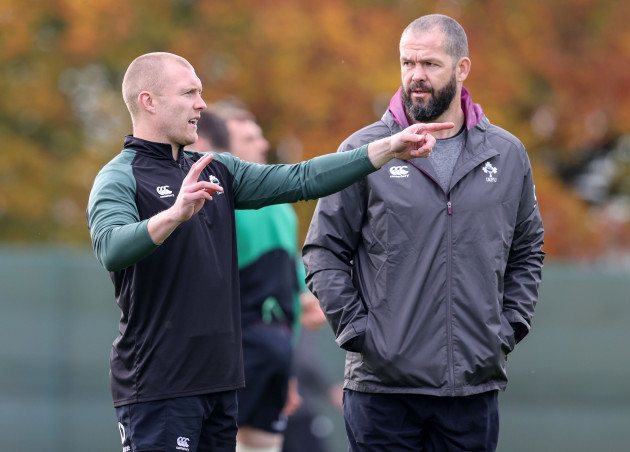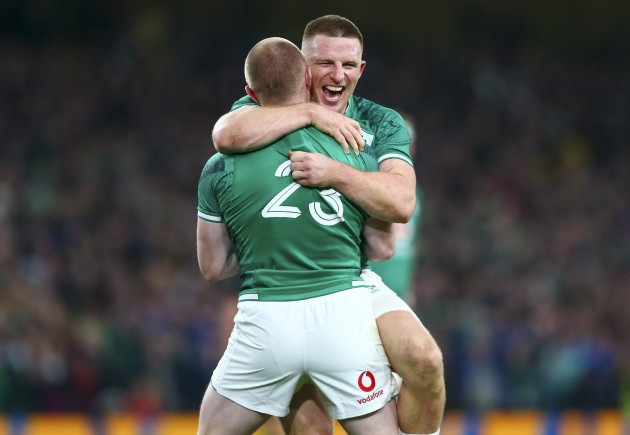KEITH EARLS HAS experienced a lot of different emotions over the past few weeks. Pride, nerves, joy, doubt. The Munster player has always been a popular figure in Irish Rugby, but his words and actions this autumn have made an impact that reaches far beyond the sports pages.
Let’s start with the interview. In mid-October, Earls appeared on The Late Late Show to discuss his new autobiography, titled Fight or Flight. It looked a harmless enough title without knowing the context. The conversation that followed shocked not only the viewers, but also many of Earls’ teammates, as the Munster and Ireland player discussed his long, often difficult battle with anxiety, literacy and mental health.
“We played against Connacht the night after The Late Late Show, even the Connacht lads on the pitch were saying, ‘fair play to you’,” Earls explains.
“I’ve spoken to other teammates as well. I’d know some of our teammates would have the same issues as well without really bringing it up. I’ve had plenty of conversations with lads but not too many knew about my own struggles… But it’s been a great reaction off them. I’ve got a text off one or two fellas saying they’ve now gone and spoke to someone as well.
I was overwhelmed by a lot of the messages that I got, but it nearly relaxed me and kind of motivated me as well. It’s amazing the amount of people out there with a similar story.”
In the book – a collaboration with sportswriter Tommy Conlon – Earls details the embarrassment or anger he sometimes felt around the thoughts in his head, or his struggles around literacy. Now that his story is out there, a different emotion prevails.
“I have massive pride in it. It’s a bit crazy really that it hasn’t really been spoken about… I know mental health and everything is getting better but it’s amazing really. Everyone definitely suffers from something but some fellas are better at getting out if it and understanding it.
“Look, I’m unbelievably proud, but it’s weird that it’s had such a massive impact.
“At the start I was a bit embarrassed about it because of the stigma around it and that’s something which we’re trying to get rid of, the stigma of speaking about it. People have been so nice and, in a way, I suppose it’s a brave thing to do, put your story out there and keep being a professional. Trying to be a so-called ‘macho man’ rugby player but at the end of the day we’re all human as well and that’s what Andy (Farrell) and all of us in here are all about as well: the human side of the rugby player.
“We’re getting to know each other on a deeper level than any squad I’ve ever been involved with.”
Farrell’s role shouldn’t go unnoted. It was only last season that Earls told his Munster teammates he had been diagnosed bipolar, having kept that part of his life private for a number of years. Most of the Ireland squad only found out when watching The Late Late. He had had a conversation with Farrell before that, and the Ireland head coach offered encouragement and support. When Earls was then called on during a backs versus forwards spelling competition in Ireland camp, Farrell politely excused the winger.
Farrell’s man-management has been highlighted previously, and its telling that his players feel so close as a squad.
“Obviously Andy is massive about getting to know each other off the field, but during lockdown in 2020 when we were in the squad, we couldn’t go anywhere,” Earls continues.
“We were literally locked away for the Autumn Nations Cup and the Six Nations so we were all kind of jumping from each other’s rooms and having coffees, all the boys set up the machines.
“We were in each other’s company 24/7, we weren’t left go home and that’s how we got to build that relationship and then the trust as well on the field and seeing how hard fellas train and what they do off the field in analysis.
“And the style of play we’re playing now as well, everyone wants to be a part of it which is great.”
Rugby, and people, have changed since Earls was first breaking into the professional ranks. The modern-day Ireland camp is a very different environment to the one he first encountered at Munster.
“Even the forward in the book written by ROG (Ronan O’Gara), he even feels a small bit guilty on how they (Munster) played on emotion and how it rubbed off on me, and it did, but I knew no different,” Earls says.
A lot of the things I wanted do and the way I wanted to act, I couldn’t really do it because that’s not how it was done in Munster. Thankfully, in 2011, a couple of lads like Conor Murray, Dave Kilcoyne, Mike Sherry and Peter O’Mahony started to break through, things changed a small bit. It’s all about being calm during the week, so you can have a clear head and perform at the weekend.”
And performing at the weekend is still the day job. The 34-year-old remains an important member of the squad, having signed a new one-year extension to his IRFU central contract last March.
Against New Zealand, Earls came off the bench to see out the game at centre, making a number of important contributions in his nine minutes on the pitch.
“As weird as it sounds when you’re on the bench, to be on the field when the final whistle blows for a victory like that – it’s incredible,” he explains.
“I’ll never forget the feeling, myself and Andrew Conway looking at each other at the final whistle, two of us probably competing for the same position but I was delighted for him because he missed out on a lot of big games, big victories. For him to finally get a win over the All Blacks was huge.
“That’s the way I’m looking at it, if I’m on the bench – I’m thinking the bench is probably more important, coming on and finishing the game.
“It’s been brilliant. The style of play we’re playing as well, we’ve worked on that the last couple of months and it’s great to see it come out the last two weeks and everything come together.
“I’m just happy to be playing my part, I think the fact of the utility and being able to play in a couple of positions, it’s got me on the bench.
“I’m not giving up on it, I’m going to fight for that starting spot but when players do get to a certain age coaches do have to start looking at other people.
“But, I’m certainly not going to just step away from it. After all my injury issues have been sorted out, I want to keep going.”
- Originally published at 06.45
Bernard Jackman, Gavan Casey, and Murray Kinsella reflect on Ireland’s stunning win over the All Blacks, hail Ciara Griffin’s Ireland career, and chat about Rassie:
The42 Rugby Weekly / SoundCloud



